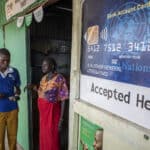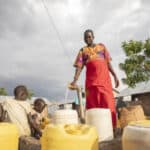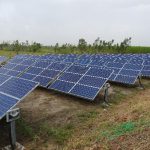Empowered agents from the local communities are the key to the success of any business initiative. They adapt easily to the local population and are more appealing to potential customers because ultimately they are familiar with the local culture, and their networks are intact.
FAQ Group: WEEE Centre
Waste Electrical and Electronic Equipment Centre (WEEE Centre)
What are some of the foreseeable impacts in the Kakuma and Kalobeyei area following your interventions?
We anticipate a large population of young people with hands-on skills for the repair and maintenance of electronic devices, as well as sales agents. The intervention will also enhance digital skills, especially among the youth leading to better employment opportunities and economic empowerment.
What do you look forward to doing in Kakuma/Kalobeyei? How do you see your business growing in the next 5 years? What challenges have you had to overcome?
Our operations will concentrate on training agents, public awareness and e-waste management. The trained agents will also act as collectors
and repairers of electronic devices.
Getting qualified refugees and local community members to serve as core project team members has been a challenge. We have had to work with some staff members from Nairobi to train and empower locals before they can take full control.
What attracted you to the Kakuma/Kalobeyei area? Why did you choose to apply for the KKCF funding?
KKCF funding presented an opportunity for WEEE Centre to reach the refugee and host communities with an e-waste management programme, with the added potential for job creation among the youth.
The growing consumption of ICT and solar powered devices in Kakuma and Kalobeyei by refugee communities and humanitarian organisations, has led to the generation of significant amounts of e-waste, which if it is not managed in a manner that is environmentally friendly, it can become toxic to public health and the environment .
There is a large population of unemployed youth in Kakuma and Kalobeyei that could be engaged to earn decent incomes from e-waste management by collecting, repairing and recycling it.


